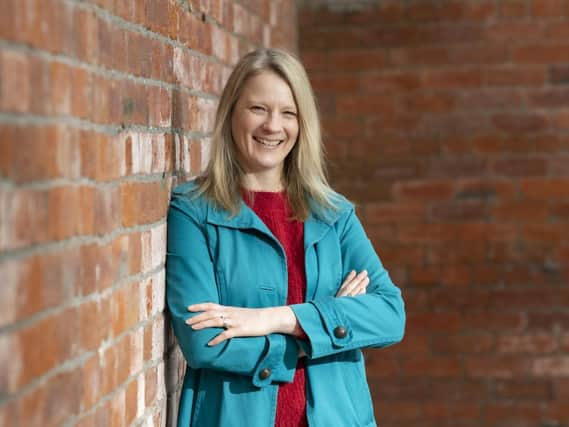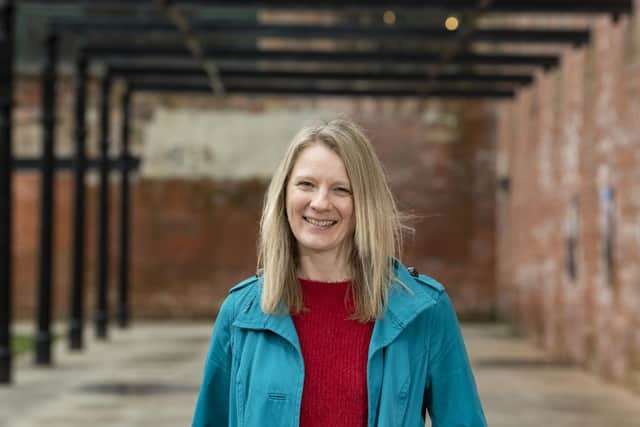How sporting heritage can tell us so much about today and why it needs to be more diverse


There’s a lot that we can learn as a society from the past and that is why understanding and cherishing heritage is so important. While sport has a way of reflecting or even challenging society.
Dr Justine Reilly is on a mission to help bring to light often overlooked sporting collections through Leeds-based community interest company Sporting Heritage.
Advertisement
Hide AdAdvertisement
Hide AdShe said: “Sporting Heritage exists to support any organisation or individual that has a collection or memorabilia, objects, archive photographs – whatever it might be of the sporting past.


“It’s there to share that story of individual heritage and community heritage as widely as possible so that those collections are protected in the long term.”
The not-for-profit community interest group helps organisations and individuals understand the different stories that they can tell with their collections. It also helps network relevant groups together.
Dr Reilly se tup Sporting Heritage in 2012 while doing her PHD in sports, museums, and cultural policy.
Advertisement
Hide AdAdvertisement
Hide AdShe saw that off the back of the successful London Olympics people were talking about sport but the heritage wasn’t being recognised.
However, Sporting Heritage didn’t really start delivering activities until Dr Reilly finished her PHD in 2014.
“Most of the collections aren’t held in formal heritage venues like museums and archives but they tell so many important cultural stories, as a result of that Sporting Heritage came into existence,” Dr Reilly says.
Dr Reilly actually started her career in the television industry as a producer for the BBC and Granada TV.
Advertisement
Hide AdAdvertisement
Hide AdHowever, her heart was never really in the industry. She was interested in heritage and cultural institutions. So in 2001, Dr Reilly started working at National Museums Liverpool with its education team.
“It was brilliant to see how the collections could be changed and adapted by working with different communities,” she says. “How it could open access to museums and heritage, that should be open to everybody but that traditionally has been quite exclusive.”
A year later she moved across to the National Media Museum in Bradford to become its deputy head of learning development.
After another short period back in television helping the BBC engage with different audiences through its outreach programme, Dr Reilly was back in the heritage sector.
Advertisement
Hide AdAdvertisement
Hide AdThe founder of Sporting Heritage has always had an interest in sports and comes from a sporty family.
She said: “I’ve always been a sports fan. My grandad was a cricketer. He broke his arm when he was 25, which would have been around 1930, and had to stop playing.
“I think he was about to play for Warwickshire at the time. My dad was a cross country runner and a rugby player.”
Dr Reilly herself captained her school netball team and has also commentated on football matches for hospital radio.
Advertisement
Hide AdAdvertisement
Hide Ad“I enjoyed playing as well as watching,” she says. “That’s always been there. Because it’s always been a part of my heritage, I recognised why it’s part of communities.
“I had that interest anyway and I had a real interest in heritage so it was a natural to think about – why aren’t these two things being supported more?”
Sporting Heritage has just delivered a research programme looking at how black, Asian and minority ethnic (BAME) collections are often overlooked.
Dr Reilly said: “We know that sporting heritage that exists within the UK is actually very diverse. We know that there are lots of different communities and cultures that have it.
Advertisement
Hide AdAdvertisement
Hide Ad“That heritage exists but it’s being ignored and we’re choosing within the public realm not to share it.
“Sporting Heritage wants to change that. This isn’t acceptable.”
The next step for the organisation is to ensure that it is talking to the right partners to help close this gap.
“We’re setting up an advisory group so that they can help us and say ‘all these things exist here, you need to be going in and doing this’,” Dr Reilly says. “We can help support the sector to understand how to do that better.”
Advertisement
Hide AdAdvertisement
Hide AdThe England national football team’s black players faced a barrage of racist abuse after the team fell agonisingly short at the Euros earlier this summer. Creating greater awareness of black sporting heritage can help tackle the issue of racism. Dr Reilly added: “When you look at what happened with the England team, it must be incredibly difficult to be a player in that team because of the pressure that is put on them. They know what is going to happen when things go wrong.
“For that to then be attributed to racial issues is just abominable and not acceptable. We all have a part to play in changing that narrative.”
Sporting Heritage is also looking to make heritage and cultural spaces inclusive for neurodiverse people. It’s a cause that is personal for Dr Reilly, who was diagnosed with autism as an adult.
“Museums and heritage collections need to be made accessible for all different neurodivergent people by asking them or putting them at the centre of it,” she says.
Advertisement
Hide AdAdvertisement
Hide AdThe organisation, which is currently working with a team of 15 specialists, is gearing up for its annual National Sporting Heritage Day on September 30.
“That is our national campaign,” Dr Reilly said. “We set up the campaign so that there would be an annual focus on sporting collections.”
Establishing Sporting Heritage has enabled Dr Reilly the opportunity to combine her interests and make a difference in the wider sector.
It has also allowed her to work with big sporting institutions including Liverpool Football Club, who she supports.
Advertisement
Hide AdAdvertisement
Hide AdSetting up a not-for-profit is “really difficult”, Dr Reilly says, particularly when you haven’t done it before.
“You’re trying to ensure everybody understands what you are about and why they should invest in you,” she added.
Dr Reilly wants Sporting Heritage to be “resilient” in the long term so that there is enough support for different sporting collections.
Curriculum vitae
Title: Founding director of Sporting Heritage
Date of birth: December 5, 1974
Lives: Farsley, Leeds
Favourite holiday destination: Guatemala
Last book read: The Authenticity Project
Favourite film: Raiders of the Lost Ark
Favourite song: Son of a Preacher Man, Dusty Springfield
Car driven: Seat Leon
Most proud of: Helping to set up Tutti, Leeds Community Concert Band
---
Support The Yorkshire Post and become a subscriber today.
Advertisement
Hide AdAdvertisement
Hide AdYour subscription will help us to continue to bring quality news to the people of Yorkshire. In return, you'll see fewer ads on site, get free access to our app and receive exclusive members-only offers.
So, please - if you can - pay for our work. Just £5 per month is the starting point. If you think that which we are trying to achieve is worth more, you can pay us what you think we are worth. By doing so, you will be investing in something that is becoming increasingly rare. Independent journalism that cares less about right and left and more about right and wrong. Journalism you can trust.
Thank you
James Mitchinson
Comment Guidelines
National World encourages reader discussion on our stories. User feedback, insights and back-and-forth exchanges add a rich layer of context to reporting. Please review our Community Guidelines before commenting.